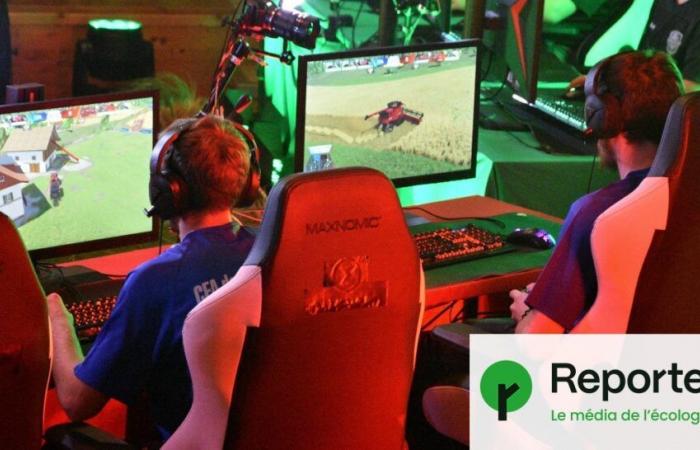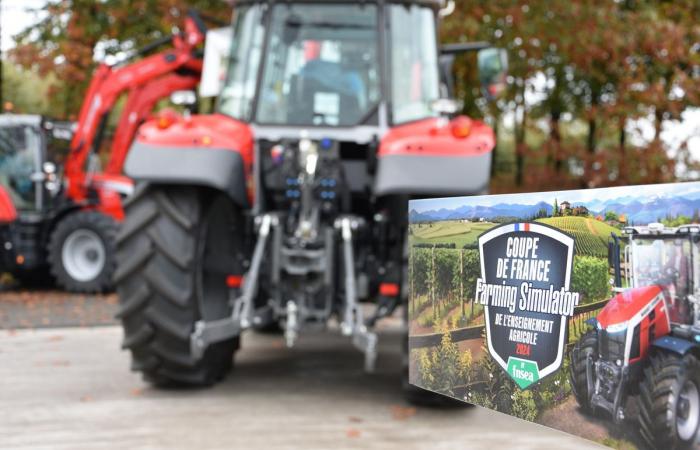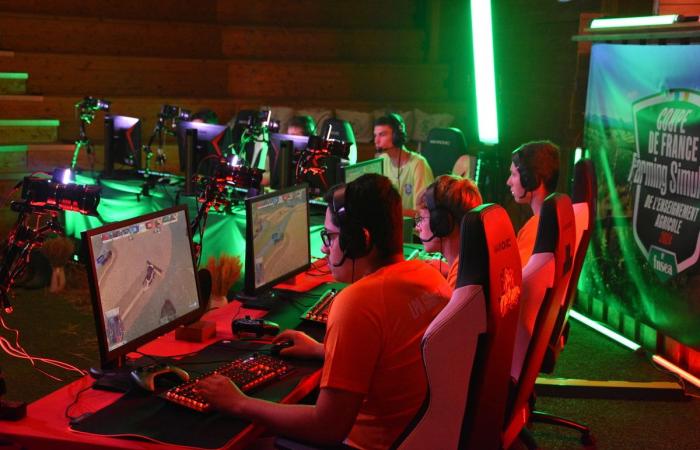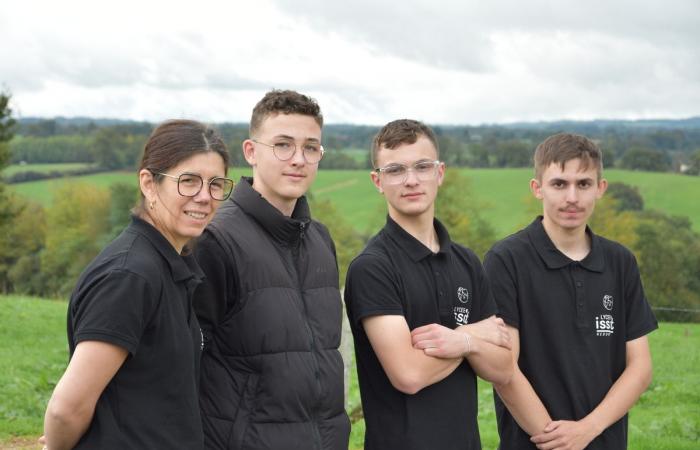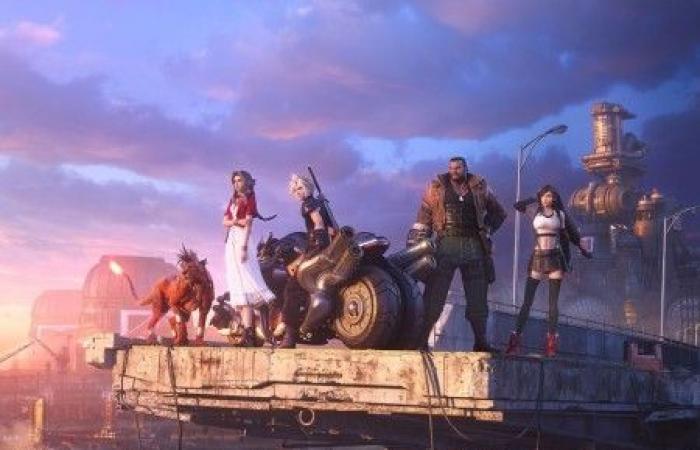Limoges (Haute-Vienne), report
« We need to get the combine there, and faster than that ! » Between red and green neon lights and smoke machines, two trios of high school students compete this Saturday, October 26, during the final of the French Cup of Swiss video games Farming Simulatorthe latest version of which comes out on November 12. A meeting organized by the National Federation of Farmers’ Unions (FNSEA), the majority agricultural union with a productivist vision.
At Limousine Park in Limoges, eight teams are participating in a unique event: collecting the most bales of hay in record time – a competition broadcast live on YouTube and Twitch. Very realistic, especially in the representation of machines, this simulation game fascinates young people in agricultural high schools. At the head of a farm (which must be expanded and made profitable to advance in the game), players take on the role of a versatile farmer: breeding, cereals, market gardening or processing…
Since the first edition in 2008, the popularity of the game has not weakened: the latest version (2022), accessible on all consoles and computers, has sold 6 million copies, a significant figure. Among the tournament’s competitors, Claire Vasseur has been playing almost every day for four years. Mathias Roussignol, a lively and confident young man, prides himself on « 5,000 hours of practice ».
His teacher, Maxime Poulain, even installed the game in his high school’s computer room. « We must not hide our faces: 90 % of high school students in agricultural technical fields play. I sometimes use it as a learning aid. » He adds: « L’aspect “gaming” [jeu] is a good way to attract people to our sectors, which have difficulty recruiting. »
An opinion shared by Fabienne Garel, elected to the board of directors of the FNSEAwhich did not skimp on the means to mobilize players: leaflets, posters, articles in the specialized press – notably the media Succeedof which the union is the main shareholder —, and distribution of « goodies » at the end of the tournament.
The National Union of Public Technical Agricultural Education (Snetap) does not view this initiative favorably. In a letter dated October 10 addressed to the Ministry of Agriculture, that Reporterre obtained, he denounced, regarding the Cup, « low noise entryism […] of the FNSEAwithin public agricultural high schools »and reported « a serious breach of neutrality […] public establishments ».
Accusations refuted by the FNSEAwhich denies « an intention behind the organization » and any financial arrangement with the franchise Giants Software, developer of Farming Simulatorif not the free authorization to use the game. Any resemblance between the game and the agricultural model promoted by the union would, according to the FNSEAfortuitous.
The two teams of three players compete in three ten-minute rounds: collect the most grain, form the most bales of straw, etc.
© Giants Software
An opinion that Snetap does not share: by making « the spotlight on agro-industry », Farming Simulator would be a « propaganda object for a single agricultural model, based on large farms, intensive use of pesticides and larger and more expensive machines ».
Rémi Jay-Rayon, teacher at Olivier de Serres high school, in Ardèche, agrees: « The game pushes you to go to the latest levels to unlock the most powerful machines. » It is therefore through the prism of innovation that its students project themselves into agriculture. They are not the only ones: since the 1950s, the productivist model has exuded a machinist fascination, explains Nicolas Legendre, author of Silence in the fields (ed. Arthaud, 2023): « The tractor is a symbol of success, social pride and family transmission. »
Beyond the emotional attachment, machines are the symptom, according to him, of the technicist and productivist headlong rush of the agricultural world. « They are more and more expensive, you can only go into debt to buy them. »
The French Cup of “ Farming Simulator », organized by the FNSEAwas held on October 26 at Limousine Park, in Limoges.
© Natacha Marbot / Reporterre
And the game makes no mistake. The credit mechanic is quickly imposed on the player who wants to equip themselves, particularly for those fond of the latest precision farming technologies – title of the aptly named expansion released in 2021. Marketed « ecological and sustainable »it allows the user to spread less, but better, inputs and pesticides. « Show off »for Nicolas Legendre, who denounces an element of language. « Reduce the doses, okay, but we still have to look at the concentration of the products, which tend to be more and more powerful, especially the synthetic ones. »
Technologies like satellite data service which, in real life, represent a significant cost for farmers, beyond the reach of small farms. Contacted by Reporterrethe developer Giants Software did not respond to our requests.
« There is no free will in video games »
Aware of « sustainable development issuesJordan Dubourg, a tall, 26-year-old man, believes that they are not incompatible with Farming Simulator. We retain our free will. To use pesticides or not, the decision is up to the player. » A position often put forward by defenders of the simulator. But who, for Valentin Serri, video game scriptwriter at the French developer Sloclap, « is not honest ».
He refutes the « notion of free will in this area ». « The player is constrained by what the game creator decides. If the scenario does not encourage agroecology, the user does not go there ». Drawing on his experience of the concepts of « fun » and realism in video games, he explains: « Designers must respond to a requirement intrinsic to gaming: proportionality between playing time and feeling of power. »

The game offers a catalog stocked with agricultural equipment, with the latest models of machines whose 3D modeling is provided by the brands.
© Natacha Marbot / Reporterre
Particularly interested in questions of « desirable futures » and of « new imaginations » in video games, Valentin Serri notes that « if there are ecological alternatives, they must be profitable for the player. For example, he could gain points thanks to the presence of biodiversity on his farm ». The absence of cutting-edge technologies is not necessarily a deterrent, as evidenced by the success of the game Stardew Valleyin which the player takes over an old farm in a village (30 million players since 2016).
An imagination to deconstruct
« Farming Simulator is not the big culprit you might thinkestimates Thomas Borrell, member of the Atelier paysan, a cooperative author of Taking back the land from the machines (ed. Seuil, 2021). It is only a reflection of the dominant model. » And young people, especially those from farming families, integrate this model well before arriving at high school: « If they like machines, it often comes from their childhood. »
Thus, they appreciate finding in Farming Simulator what they know and find realistic. « Teaching struggles to counter the representations with which students arrive. » These fantasies, populated by tractors with more than 400 horsepower and disembodied management of the farm, are far from the agroecological model promoted by the Atelier paysan.

Guillaume, Jérémy, Noah and their teacher Florence Raison, from Issat Redon (Pays de Vilaine), traveled from Brittany for the competition.
© Natacha Marbot / Reporterre
Farming Simulator could it nevertheless boast of triggering the vocations of young people far from the peasant environment? ? If the lack of attractiveness of these professions is an observation shared by all those interlocutors, the solutions divide. For Thomas Borell, « seduction by technical progress – of which gaming is the archetype – is a counterproductive strategy, because the use of machines on increasingly large farms causes pressure on land. Their work, ultimately, replaces that of humans ».
From Ardèche where he teaches, Rémi Jay-Rayon admits he is embarrassed to encourage his students to settle down, aware of the difficulty of finding land and salaries « ridicules ». He is annoyed by the millions of euros spent on the communication plans of the ministry, which also organized a tournament in 2021. Farming Simulator. For him, what could make young people want to become farmers, « they are happy farmers, with a decent salary, not limitless technology. »
At Neubourg high school (Eure), Nathan Milange, in final year CGE (conduct and management of the agricultural business), little by little realized the difficulty of the condition of agricultural employee. Ten years of Farming Simulator later, those who dreamed of being a farmer as a child now prefer to sell or operate machines.
legend

